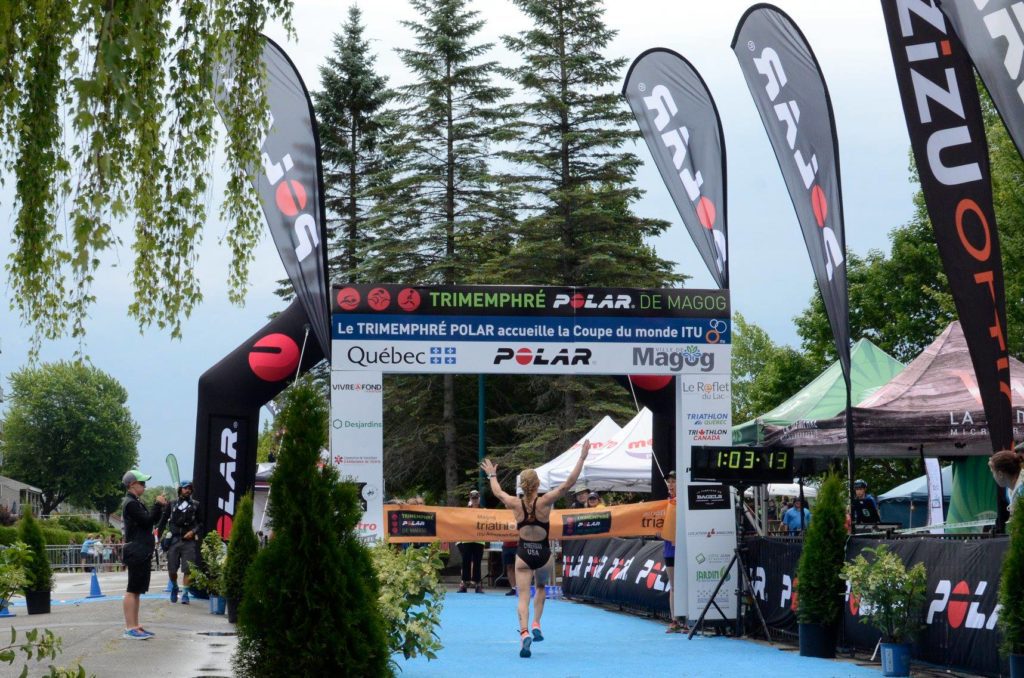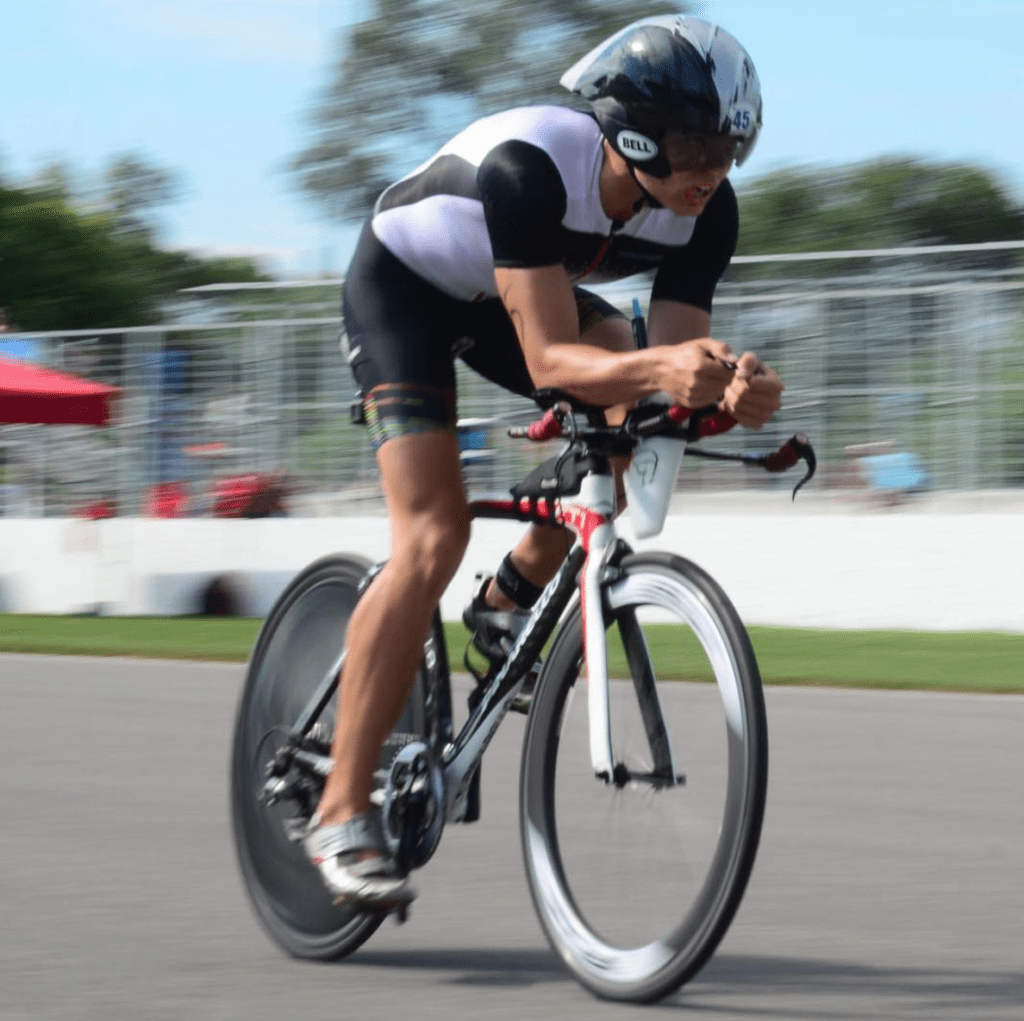Updated: Quebec’s triathlon circuit takes steps towards reopening
Some Quebec triathletes will have the opportunity to race again starting this month
 Photo by:
Esprit Triathlon
Photo by:
Esprit Triathlon
Editor’s Note: We’ve now learned from the organizers of the Esprit Triathlon that “All Canadians are now allowed to come to Quebec without quarantine,” which means athletes from other provinces will be able to attend that event, at least. (Barring changes in the regulations.)
When 50 triathletes in the town of Gaspé, Que., dip their toes in the Gulf of St. Lawrence at low tide on the evening of Friday, July 24, they’ll be unofficially launching the competitive triathlon season in Quebec.
Quebec is by far the province hardest hit by COVID-19, forcing the provincial government to prohibit all major sporting events soon after the pandemic was declared. There have been comparatively few coronavirus cases on the Gaspé Peninsula. Still, organizers of the July 24-25 race are taking every precaution to keep athletes well apart. The races — a sprint with an extra-long 1.6K swim and an Olympic distance — will take place over two days, with no transition zones.
For the swim leg on Friday, swimmers will seed themselves, fastest to slowest, and set out one athlete at a time, 30 seconds apart — no passing allowed. The bike leg will happen Saturday morning, with riders setting out every 30 seconds on a course that has lots of room to pass. The run leg mid-afternoon will again see athletes setting out one at a time, at 30-second intervals. If all goes well, Triathlon Gaspé will stage a repeat event in mid-August, this time open to 80 athletes.
No distribution of timing chips is permitted, so the races will be timed manually. No athlete marking. No finishers’ medals. No award ceremony or post-race lunch.
Welcome to triathlon season 2020. But in Quebec, to the relief of many, there is once again the possibility for age-group triathletes to race.

Trimemphré says, ‘See you in September’
TriMemphré on Lake Memphremagog in Quebec’s Eastern Townships was to have celebrated its 25th anniversary on July 11 and 12, with 19 races, including the half distance, for every age category from five and up. That didn’t happen. The triathlon festival’s organizer, René Pomerleau, has just received the go-ahead from the City of Magog to hold a sprint-only race on Sept. 5 and is awaiting final approval from the Quebec Health Ministry. The race will be limited to 1,000 participants from age 13 and up, with 500 competing in the morning and 500 in the afternoon.
“Swimmers will head out onto the course one at a time, every 15 seconds,” Pomerleau said. “The bike portion will be on our old sprint bike course, an out-and-back, and the run will be on our usual course, where there is very little problem with athletes crossing one anothers’ path.”
Every athlete will be given a swim start time and will be asked to show up no more than an hour before their race, and spectators will be discouraged.
“There will be as little contact as possible,” said Pomerleau. “Volunteers will be given masks to wear. There will be no lunch, no medals and no tents where people could mingle. We think we should be OK.”
Pomerleau is waiting until three weeks before the event to reopen registration, just in case there is a resurgence of COVID that forces organizers to change plans again. The 350 people who signed up for the event before the pandemic will be given the choice of competing or postponing their race until 2021. After that, it will be first come-first served, and Pomerleau expects the race to fill up fast.
“People just really want to move,” he said. “We believe in this sport, and people who have been training all year, they just really want to get out there.”

Montreal Esprit: It’s a go
“I never even thought about not going ahead,” says Danny McCann, another veteran triathlon organizer. McCann says even if the postponed Montreal F1 Grand Prix decides to hold an October race on the Circuit Gilles Villeneuve that’s also home base for his Esprit Triathlon, the track will be free and clear for the triathlon’s 36th edition on Sept. 12 and 13.
“This is not like the New York Marathon, where there are 50,000 people, and there is no chance of social distancing,” he said. “I worked it out on the bike course: if we have 500 triathletes on the circuit, each athlete could have 86 square metres to ride by themselves. The trouble is, however, everybody wants to be on the inside lane.”
McCann says he knows a rash of new COVID cases could change his plans, but barring that, he has made provisions for every possibility.
The swim, in the Olympic rowing basin on Montreal’s Île Notre-Dame, will be a rolling start, with six triathletes spaced two metres apart from one another heading out every 10 seconds.
“We can’t have our normal wave start with 100 or 200 people,” he said. As for the run course, McCann said there are very few places where the course is narrow. “There’s lots of room to pass.”
“I mean, it’s not going to be the race this year to make friends on the run, to pick somebody at your pace and say, ‘Let’s do a kilometre together.’”
There will be water on the course, but athletes will have to stop and fill their cups themselves. Volunteers aren’t allowed to hand water or food to the athletes, even with gloves on.
“We can’t even cut up watermelon and offer it to people. Everything has to be packaged,” says McCann. “We can hand out bananas on the bike course, but we can’t cut the bananas in half. So people are going to have to stop at the rest stop because we’re not going to have 4,000 banana peels all over the circuit.”
“People are going to have to be a little more self-sufficient than they normally would be.”
McCann prides himself with offering the best expo on Canada’s triathlon circuit, but he’s had to cancel it this year. Like the other races, there will be no after-race lunch, no finishers’ medals, no award ceremony. He is not even allowed to hand out T-shirts. Volunteers will be in masks, and athletes must wear masks whenever they’re not competing. Spectators will be discouraged but not barred from the event, as there is lots of space in the stands for them, and McCann will have volunteers enforcing physical-distancing rules.
McCann does not plan to put a reduced cap on the number of participants, however, so far, he said, the Esprit is open to Quebec triathletes only. With so many athletes, including the long-distance Esprit record holder, former pro Rick Hellard, regularly making the two-hour trip from the Ottawa Valley to participate in Esprit, McCann is hoping to persuade public health authorities that the race should be open to everyone within easy reach of it.
“Whatever we’re told to do, we’ll do,” he concludes. “I don’t want to get sick, let alone an athlete or a spectator. I don’t want anyone to ever say I went to Parc Jean Drapeau and I caught it. We’re doing everything we can to make sure everybody is going to be safe.”
